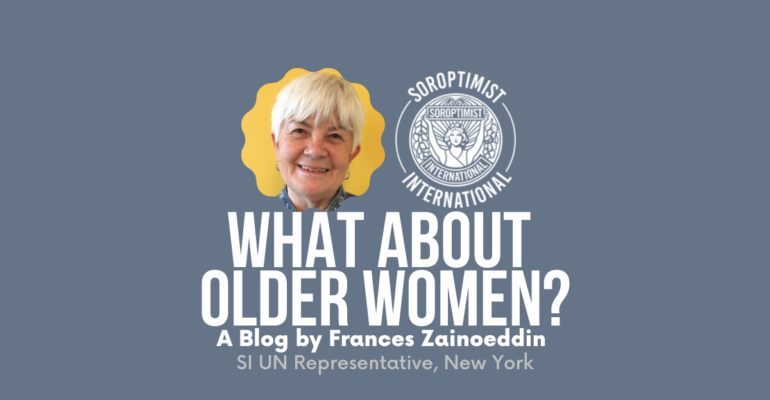Blog by Frances Zainoeddin, Representative to the United Nations, New York.
What attention is being given to older women? NOT MUCH!
A recent letter sent by the three NGO Committees on Ageing in Geneva, New York and Vienna to the new Executive Director of UN Women, expressed concern that UN Women has basically failed older women. I’m calling on all Soroptimists to take a life-course approach. The issues raised with UN Women were:
- Gender equality does not end with reproductive age.
The intersections with age and the accumulation of the different forms of discrimination across the life course, result in particular disadvantages to older women. Ignoring attention and services that should be provided to women as they get older equals ageism.
- Sexual and Reproductive Health and Rights (SRHR)
As women grow older, they experience a range of health conditions linked to reproductive and sexual health – from ageing with fistula, to cervical, ovarian and breast cancers, menopause, hormonal changes that contribute to an increased risk of cardiovascular disease, osteoporosis and mental health issues, among others. They may have to undergo mastectomies or hysterectomies and may be denied access to adequate health services. Women’s health should not be focused just on reproductive age. Older women may not reproduce but they do have reproductive health needs and they remain very productive in society. Older women may also be sexually active and in need of sexual health services. HIV infections among older people are on the rise and yet, they are overlooked due to ageist stereotypes. A focus on women’s health must take a life-course approach and include older women.
- Gender-based violence
Violence against women, regrettably, does not disappear beyond reproductive age. Ageist stereotypes must be challenged. Elder abuse by different perpetrators, including health care workers, family, and other caregivers, is rampant throughout the world. In all settings and particularly in humanitarian settings, age is not a protection from GBV and rape. SDG 5 dropped the upper age caps. Data on gender-based violence must be collected, analysed and adequately applied in programmes beyond the age of 49.
- Harmful Practices – Female genital mutilation (FGM)
Such practices will never be eliminated unless older women are seen as part of the solution. For that, older women need to understand they also have rights to receive the appropriate capacity-building and training. Older women are also subject to deadly harmful practices such as widowhood rites, accusations of witchcraft, burning and ejection from their land.
- COVID-19 pandemic
The devastating impact on older persons and persons with disabilities cannot be ignored. Among women who died from COVID-19, 87 per cent were aged 60 and over. The tragically large number of fatalities could have been reduced had appropriate services been in place and older people’s rights been protected. Older persons are among the first victims of all humanitarian crises and older women suffer the impact of the pandemic in multiple ways.
- Leaving no one behind
This must be inclusive of ALL women groups that have heretofore been left behind – older women, women with disabilities, indigenous women, ethnic minorities, LGBTQI, migrants, women of African descent, etc. There is no excuse to leave any group behind.
- Meaningful data
There is an urgent need for collecting and analysing disaggregated data on gender and age to provide a full understanding of the lived realities and experiences of older women and men.
SOROPTIMISTS – include older women on the journey to equality !


Just gave a local Ruby award to our Mah Jongg coach for her years of expanding our hearts and minds.
We think, share and care, together.